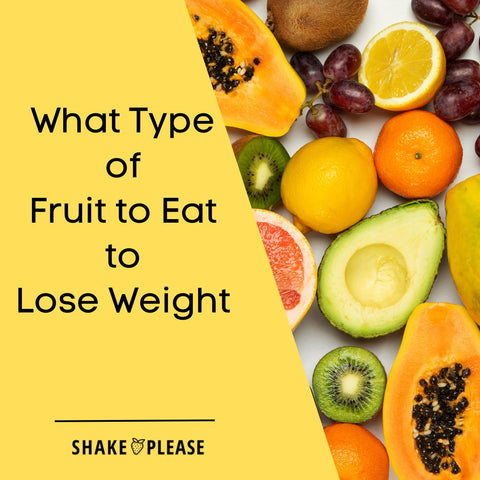
Are you on a weight loss journey and looking for healthy and delicious fruit to help shed those extra pounds?
Look no further!
In this ultimate guide, we will explore the different types of fruits that can aid in weight loss. Whether you're craving something low in calories, high in fiber, or with fat-burning properties, we've got you covered.
Plus, we'll share some tips on incorporating a variety of fruits into your diet and how portion control plays a crucial role in successful weight loss.
So, let's dive in and discover the power of fruits in your weight loss journey.
Low-calorie fruits for weight loss
One of the keys to losing weight is consuming fewer calories than you burn. Luckily, there are plenty of delicious fruits that are low in calories, making them a perfect addition to your weight loss diet.
For instance, berries such as strawberries, raspberries, and blackberries are not only bursting with flavor but also low in calories.
A cup of strawberries contains only about 50 calories, while raspberries and blackberries have around 60-70 calories per cup. These fruits are also packed with vitamins, minerals, and antioxidants, providing numerous health benefits alongside weight loss.
Another great option is citrus fruits like oranges and grapefruits. These fruits are not only refreshing but also low in calories. A medium-sized orange contains approximately 60-70 calories, while half a grapefruit has only 50-60 calories.
Citrus fruits are also rich in vitamin C and fiber, which can help boost your metabolism and keep you feeling full for longer, aiding in weight loss.
If you're looking for a tropical twist, consider adding pineapple and papaya to your diet. These fruits are not only low in calories but also contain enzymes that can help improve digestion and promote weight loss.
A cup of pineapple chunks has around 80-90 calories, while a cup of papaya cubes contains approximately 60-70 calories. So, grab a refreshing fruit salad or blend these fruits into a smoothie for a guilt-free treat while on your weight loss journey.
High-fiber fruits for weight loss
Fiber is an essential nutrient when it comes to weight loss. It helps keep you feeling full, aids in digestion, and promotes a healthy gut.
Fortunately, there are plenty of high-fiber fruits that can support your weight loss goals. One such fruit is the humble apple.
Apples are not only delicious but also rich in fiber. A medium-sized apple contains around 4-5 grams of fiber, making it a perfect snack to curb hunger and keep you satisfied between meals.
Another fiber-packed fruit is the pear. Pears are not only juicy and sweet but also contain a significant amount of dietary fiber.
A medium-sized pear provides approximately 5-6 grams of fiber, making it a fantastic addition to your weight loss diet. The fiber in pears can also help regulate blood sugar levels and improve digestion, making it easier for your body to break down and absorb nutrients efficiently.
If you're a fan of tropical flavors, consider adding guava to your diet. This tropical fruit is not only rich in vitamin C but also packed with fiber.
One medium-sized guava contains around 9 grams of fiber, making it one of the highest fiber fruits available. The high fiber content in guava can help keep you feeling full and satisfied, reducing the likelihood of overeating and aiding in weight loss.
Fruit smoothies for weight loss
If you're someone who enjoys a refreshing and convenient meal on the go, fruit smoothies can be your best friend during your weight loss journey.
Not only are they quick and easy to make, but they also provide a great opportunity to incorporate a variety of fruits into your diet. To make a healthy and weight-loss-friendly smoothie, start with a base of low-calorie fruits such as berries, citrus fruits, or melons.
These fruits will add flavor and nutrition without adding excessive calories.
To add an extra boost of fiber and nutrients, consider adding leafy greens like spinach or kale to your smoothies.
These greens are low in calories but rich in vitamins, minerals, and fiber, making them an excellent addition to your weight loss regimen. They can also help improve digestion and promote a healthy metabolism.
To enhance the creaminess and protein content of your smoothie, consider adding a scoop of Greek yogurt or a splash of almond milk.
Greek yogurt is not only high in protein but also rich in probiotics, which can support gut health and aid in weight loss. Almond milk, on the other hand, is low in calories and adds a creamy texture to your smoothie without the excess fat and calories found in regular dairy milk.
Remember, portion control is essential when it comes to smoothies.
While they can be a nutritious and convenient option, it's easy to overdo it with ingredients and end up consuming more calories than intended.
Stick to a reasonable portion size and focus on using whole, nutrient-dense ingredients to create a satisfying and weight-loss-friendly smoothie.
Fruits with fat-burning properties
While no single fruit can magically burn fat, some fruits contain properties that can support your weight loss efforts.
One such fruit is the avocado. Avocados are unique as they are high in healthy fats, particularly monounsaturated fats. These fats can help increase satiety, keeping you feeling full and satisfied for longer, reducing the likelihood of overeating.
Avocados are also packed with essential nutrients, fiber, and antioxidants, making them a nutritious addition to a weight loss diet.
Another fruit known for its fat-burning properties is the grapefruit. Research suggests that consuming grapefruit before meals may help reduce calorie intake and promote weight loss.
It is believed that compounds in grapefruit can help regulate insulin levels and boost metabolism, aiding in weight loss. However, it's important to note that the effects may vary from person to person, and grapefruit should be consumed as part of a balanced diet and healthy lifestyle.
Chili peppers are another fruit that can contribute to fat burning. They contain a compound called capsaicin, which gives them their spicy flavor. Capsaicin has been shown to increase metabolism and promote fat oxidation, making it a potential ally in weight loss.
Adding a touch of spice to your meals with chili peppers can not only enhance the flavor but also support your weight loss efforts.
Best fruits to satisfy a sweet tooth while losing weight
If you have a sweet tooth but still want to lose weight, don't worry, there are plenty of sweet fruits that can satisfy your cravings without sabotaging your progress. One such fruit is the watermelon.
Watermelon is not only hydrating but also naturally sweet and low in calories. It is a great choice when you're craving something refreshing and sweet without the guilt. Plus, it's packed with vitamins A and C, making it a nutritious addition to your weight loss diet.
Another sweet and satisfying fruit is the mango. Mangoes are not only delicious but also rich in fiber, vitamins, and minerals.
They can be enjoyed on their own, added to smoothies, or even used in salads for a burst of tropical flavor. While mangoes are slightly higher in calories compared to some other fruits, they can still be enjoyed in moderation as part of a balanced weight loss diet.
For a unique and tangy flavor, consider adding kiwi to your fruit selection. Kiwis are not only low in calories but also packed with nutrients like vitamin C, vitamin K, and fiber.
They can be enjoyed on their own, sliced onto yogurt or cereal, or even added to fruit salads for an extra burst of flavor. The natural sweetness of kiwi can satisfy your sweet tooth while providing numerous health benefits.
What is the role of fruit in weight loss
Now that we've explored the different types of fruits that can aid in weight loss, let's discuss the role of fruit in your overall weight loss journey. Fruits are not only delicious and nutritious but also provide essential vitamins, minerals, antioxidants, and fiber that are vital for overall health.
When it comes to weight loss, fruits can be a valuable asset due to their low-calorie content, high fiber content, and ability to satisfy your sweet cravings without resorting to high-calorie desserts.
Fruits are also hydrating, which is crucial for maintaining overall health and supporting weight loss. Staying hydrated can help boost your metabolism, reduce appetite, and improve digestion.
Incorporating a variety of fruits into your diet can ensure that you receive a wide range of nutrients that can support your weight loss goals while keeping you satisfied and nourished.
It's important to note that while fruits are an essential part of a healthy weight loss diet, they should be consumed in moderation and as part of a balanced meal plan. Portion control is key to prevent excessive calorie intake, as even healthy foods can contribute to weight gain if consumed in large quantities.
Be mindful of your overall calorie intake and listen to your body's hunger and fullness cues to maintain a healthy balance.
The nutritional benefits of fruit for weight loss
Fruits are not only low in calories but also packed with essential nutrients that can support your weight loss goals. They are a rich source of vitamins, minerals, and antioxidants that are vital for overall health and wellbeing.
For instance, citrus fruits like oranges and grapefruits are packed with vitamin C, which can support a healthy immune system and promote the absorption of iron from plant-based foods, aiding in weight loss.
Berries, such as blueberries, strawberries, and raspberries, are not only low in calories but also high in antioxidants.
Antioxidants help protect your cells from damage caused by free radicals, which can contribute to chronic diseases. Additionally, berries are rich in fiber, which can promote satiety, aid in digestion, and regulate blood sugar levels, supporting weight loss.
Fruits like bananas and avocados are excellent sources of potassium, which is essential for maintaining healthy blood pressure levels.
Potassium can also help reduce water retention and bloating, making these fruits a great addition to your weight loss diet.
Additionally, avocados are high in healthy fats, which can increase satiety and support weight loss.
Incorporating a variety of fruits into your weight loss diet can ensure that you receive a wide range of essential nutrients that are vital for overall health and wellbeing.
By choosing a colorful assortment of fruits, you can reap the benefits of their unique nutritional profiles, making your weight loss journey both delicious and nutritious.
THE ULTIMATE GUIDE TO CHOOSING THE BEST FRUIT FOR SMOOTHIES
Incorporating a variety of fruits into your weight loss diet
Now that you know the different types of fruits that can aid in weight loss and understand their nutritional benefits, let's discuss how to incorporate a variety of fruits into your weight loss diet.
Variety is the key to ensuring that you receive a wide range of essential nutrients while keeping your meals interesting and satisfying.
Here are some tips to help you incorporate fruits into your diet:
-
Start your day with a fruit-packed breakfast: Add sliced bananas or berries to your morning cereal or oatmeal. You can also blend fruits into a smoothie or enjoy a refreshing fruit salad to kick-start your day with a burst of flavor and nutrition.
-
Snack on fruits between meals: Instead of reaching for unhealthy snacks, opt for a piece of fruit. Keep a bowl of fresh fruits on your kitchen counter or pack portable fruits like apples or oranges for a nutritious snack on the go.
-
Add fruits to salads: Enhance the flavor and nutritional value of your salads by adding fruits like sliced strawberries, diced mangoes, or pomegranate seeds. The combination of sweet and savory flavors will make your salads a delight to eat.
-
Experiment with fruit-based desserts: Instead of indulging in calorie-laden desserts, satisfy your sweet tooth with fruit-based options. Grill slices of pineapple or peaches for a caramelized treat, or bake apples with cinnamon for a comforting and healthy dessert.
-
Blend fruits into smoothies: As mentioned earlier, smoothies are a great way to incorporate a variety of fruits into your diet. Experiment with different flavor combinations and add a handful of spinach or kale for an extra nutrient boost.
Remember to choose whole fruits over fruit juices whenever possible. Whole fruits contain fiber, which can help regulate blood sugar levels, promote satiety, and aid in digestion.
Fruit juices, on the other hand, can be high in added sugars and lack the fiber content of whole fruits.
Fruit and portion control for successful weight loss
While fruits are a healthy addition to a weight loss diet, it's important to practice portion control to prevent excessive calorie intake. Although fruits are low in calories compared to many other foods, consuming large quantities can still contribute to weight gain.
Here are some tips for practicing portion control when it comes to fruits:
-
Be mindful of serving sizes: Familiarize yourself with the recommended serving sizes of different fruits. For instance, a medium-sized apple or orange is considered one serving, while a cup of berries or pineapple chunks is another serving. By being aware of serving sizes, you can better manage your overall calorie intake.
-
Listen to your body: Pay attention to your body's hunger and fullness cues. Instead of mindlessly eating fruits, eat until you feel satisfied, not overly full. This can help prevent overeating and ensure that you're consuming an appropriate amount of calories for your weight loss goals.
-
Balance your fruit intake with the rest of your meal: Remember that fruits should be part of a balanced meal plan. Include a variety of other nutrient-dense foods like lean proteins, whole grains, and vegetables to ensure that you're receiving a well-rounded meal.
-
Consider the overall calorie content: While fruits are generally low in calories, some fruits may be higher in calories than others. Be mindful of your overall calorie intake, especially if you're aiming for a specific calorie deficit for weight loss. Opt for lower-calorie fruits if you're looking to reduce your overall calorie intake.
By practicing portion control and being mindful of your overall calorie intake, you can enjoy the benefits of fruits while still achieving your weight loss goals.
DISCOVER THE TOP FRUITS WITH HIGH PROTEIN CONTENT
Conclusion
In conclusion, fruits can be a delicious and nutritious addition to your weight loss diet.
Whether you're looking for low-calorie options, high-fiber choices, or fruits with fat-burning properties, there is a wide variety of fruits to suit your preferences and support your weight loss journey.
By incorporating fruits into your diet, you can enjoy their natural sweetness, essential nutrients, and numerous health benefits while working towards your weight loss goals.





